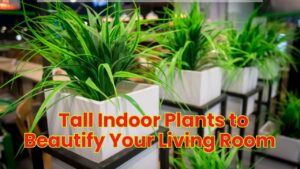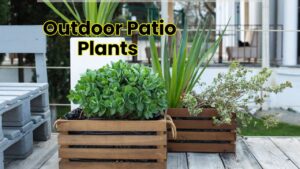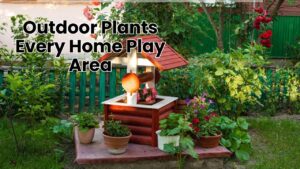Shade plants are a great way to add beauty to areas of your garden that don’t get much sunlight. Whether you have a tree canopy blocking the sun or a garden corner that’s always in the shade, there are plenty of plants that thrive in low-light conditions. The top 10 shade-loving plants that will bring color and life to those shaded spots in your garden.
1. Hostas
Top 10 Cool Houseplants for Every Room

Hostas are one of the most popular and well-known shade plants. They come in a variety of sizes and colors, with broad, green leaves, and some varieties even have variegated patterns. Hostas are low-maintenance and are great for adding texture to your garden. They prefer moist, well-drained soil and thrive in areas with partial to full shade. Plus, they bloom with lovely flowers, adding a pop of color to shaded areas.
What makes hostas stand out is their ability to grow well in almost any kind of shade—from dappled light under trees to full-on shady corners. Some varieties even tolerate dry soil conditions, but they thrive the most in moist, slightly acidic soil.
2. Ferns
Best 10 Tall Indoor Plants to Beautify Your Living Room Naturally

Ferns are classic shade plants, offering lush greenery and a soft, feathery texture. There are many different types of ferns, such as the popular Boston fern or lady fern. These plants grow well in shaded, moist environments and can handle both low and high humidity levels. Ferns work great for ground cover or in hanging baskets, and they bring a natural, woodland feel to your garden.
Their resilience in low-light conditions makes them perfect for spots under trees or on the north side of buildings, where sunlight is scarce. Additionally, ferns are relatively easy to care for, requiring only regular watering to keep their fronds lush and vibrant.
3. Astilbes
Top 10 Small Indoor Plants That Are Easy to Care For and Gorgeous

Astilbes are vibrant flowering plants that thrive in the shade. With their feathery, plume-like flowers in colors like pink, red, purple, and white, they can brighten up any shaded garden. These plants also have attractive green foliage, making them a beautiful addition even when they’re not in bloom. Astilbes do best in moist, well-drained soil, and they love partial to full shade.
Astilbes are particularly effective at adding a burst of color to shaded areas, and because they don’t require much sunlight, they are the ideal choice for planting under trees or in areas with indirect light. Their flowers are also a great way to attract pollinators like bees and butterflies.
4. Bleeding Heart
Top 10 Large Indoor Plants for Living Room That Are Easy to Grow

Bleeding Heart (Dicentra spectabilis) is a unique plant that is perfect for shaded areas. It has delicate, heart-shaped flowers that dangle from arching stems. These flowers bloom in spring to early summer and come in shades of pink or white. Bleeding hearts prefer cool, shaded spots with well-drained soil and are often planted under trees or near shady garden walls.
This plant is ideal for bringing a whimsical, romantic touch to your garden. The arching stems and flowing flowers create a serene atmosphere, making it perfect for shaded garden corners where you can sit and relax.
5. Brunnera
10 Outdoor Patio Plants to Enhance Your Backyard Space

Brunnera, also known as Siberian Bugloss, is a beautiful shade plant known for its striking foliage and tiny, forget-me-not-like flowers. The leaves are heart-shaped and can be silver or green, adding a silvery touch to your shaded garden. It’s perfect for adding contrast and texture to shady spots and does best in moist, well-drained soil with partial to full shade.
Brunnera not only adds a unique aesthetic with its silvery foliage but also blooms with small blue flowers that resemble the classic forget-me-not. It’s a fantastic ground cover for shady gardens, creating a carpet of attractive foliage and blooms.
6. Lungwort (Pulmonaria)
Best 10 Outdoor Plants With Pots Cheap and Easy

Lungwort is a hardy, low-growing plant that thrives in shady spots. It features unique spotted or silvery foliage that creates a striking contrast against its bright blue, pink, or purple flowers. Lungwort is perfect for adding color to shaded corners of your garden, and it’s a great choice for ground cover. It loves moist, well-drained soil and partial to full shade.
Lungwort is especially valuable in early spring, as its vibrant flowers bloom before many other plants. Its foliage is also an excellent addition to shaded areas, providing year-round interest even when it’s not flowering.
7. Coral Bells (Heuchera)
Best 10 Outdoor Plant Pots for Your Garden or Balcony

Coral Bells, or Heuchera, are great for shaded gardens because they offer a variety of leaf colors, including shades of red, purple, green, and silver. These plants also bloom with small, bell-shaped flowers on tall stems. Coral Bells are perfect for adding color and texture to shaded areas, and they do well in both moist and well-drained soil. They are also relatively easy to care for and can handle partial shade or light shade.
Heuchera’s colorful foliage can create dramatic effects in your garden, and because they’re low-maintenance, they make an ideal choice for gardeners looking for beauty without a lot of effort. Their flowers also attract hummingbirds, making them even more valuable in your garden.
8. Solomon’s Seal
The Perfect Plants to Make Your Child’s Play Area Bloom

Solomon’s Seal is a graceful, arching plant that produces small, fragrant, white flowers in the spring. It is well-suited for shady spots in your garden and is perfect for adding elegance to the landscape. The plant thrives in moist, well-drained soil and does well in partial to full shade. The green foliage adds texture, and its unique drooping flowers provide a soft, almost magical look to shaded areas.
Solomon’s Seal is a plant that gradually spreads over time, making it a wonderful choice for naturalizing shaded areas. It pairs well with other woodland plants and can create a natural, flowing appearance in your garden.
9. Japanese Maple (Acer palmatum)
10 Easy Outdoor Plants Every Home Play Area

Japanese Maples are beautiful trees that do well in partial shade. They are perfect for adding structure and elegance to shaded spots in your garden. The delicate, colorful leaves of Japanese Maples come in shades of red, purple, or green, making them an eye-catching addition to any landscape. They are great for small gardens, as they don’t grow too large, and they thrive in well-drained, acidic soil.
A Japanese Maple’s graceful form and colorful foliage can act as a focal point in any garden. These trees not only thrive in shaded environments but also add a sense of tranquility to outdoor spaces, making them perfect for meditation areas or places to relax.
10. Toad Lily (Tricyrtis)
The Most Expensive Houseplants in the World

Toad Lilies are unique, exotic-looking plants that thrive in shady spots. They produce beautiful, intricate flowers that resemble orchids and come in colors like purple, pink, and white with speckled patterns. Toad Lilies are perfect for adding a touch of the unusual to shaded areas and are excellent for ground cover or in garden beds. They do best in moist, well-drained soil and can thrive in partial to full shade.
Toad Lilies offer a special charm, especially in late summer or fall when their flowers bloom. They add a sense of mystery and intrigue to your shaded garden and can be paired with other shade-loving plants for a stunning effect.
Conclusion
Top 10 Most Expensive Indoor Plants

Shade plants are an excellent choice for areas of your garden that don’t receive much sunlight. Whether you’re looking for vibrant flowers, lush greenery, or unique textures, there are plenty of options to choose from. From the bold, colorful foliage of Hostas to the delicate blooms of Bleeding Heart, these 10 shade plants will help you create a beautiful, low-maintenance garden that thrives in the shade.
FAQs
What are shade plants?
Shade plants grow well in low sunlight or indirect light areas.
Can shade plants survive indoors?
10 Indoor Plants That Make Your Home Healthier and Happier

Yes, many shade plants do well indoors with filtered or low light.
Do shade plants need watering every day?
No, most shade plants need water only when the soil feels dry.
Are shade plants easy to care for?
10 Super Easy Indoor Plants That Make Your Air Healthier

Yes, many shade plants are low-maintenance and beginner-friendly.
Can shade plants grow without sunlight?
They need some light, but not direct sun. Bright, indirect light is enough.
Do shade plants clean the air?
Best Indoor Plants to Freshen Up Your Office Space

Yes, many shade plants help purify indoor air naturally.



Leave a Comment